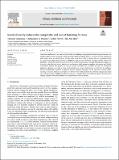Files in this item
Social diversity reduces the complexity and cost of fostering fairness
Item metadata
| dc.contributor.author | Cimpeanu, Theodor | |
| dc.contributor.author | Di Stefano, Alessandro | |
| dc.contributor.author | Perret, Cedric | |
| dc.contributor.author | Han, The Anh | |
| dc.date.accessioned | 2023-01-12T16:30:28Z | |
| dc.date.available | 2023-01-12T16:30:28Z | |
| dc.date.issued | 2023-02-01 | |
| dc.identifier | 282909832 | |
| dc.identifier | 72507972-1931-4b75-9d69-512a21bd6fad | |
| dc.identifier | 85145980421 | |
| dc.identifier.citation | Cimpeanu , T , Di Stefano , A , Perret , C & Han , T A 2023 , ' Social diversity reduces the complexity and cost of fostering fairness ' , Chaos, Solitons and Fractals , vol. 167 , 113051 . https://doi.org/10.1016/j.chaos.2022.113051 | en |
| dc.identifier.issn | 0960-0779 | |
| dc.identifier.other | RIS: urn:FBBD6BE8C9AC46E954D57D1B261C2FCE | |
| dc.identifier.uri | https://hdl.handle.net/10023/26752 | |
| dc.description.abstract | Institutions and investors are constantly faced with the challenge of appropriately distributing endowments. No budget is limitless and optimising overall spending without sacrificing positive outcomes has been approached and resolved using several heuristics. To date, prior works have failed to consider how to encourage fairness in a population where social diversity is ubiquitous, and in which investors can only partially observe the population. Herein, by incorporating social diversity in the Ultimatum game through heterogeneous graphs, we investigate the effects of several interference mechanisms which assume incomplete information and flexible standards of fairness. We quantify the role of diversity and show how it reduces the need for information gathering, allowing us to relax a strict, costly interference process. Furthermore, we find that the influence of certain individuals, expressed by different network centrality measures, can be exploited to further reduce spending if minimal fairness requirements are lowered. Our results indicate that diversity changes and opens up novel mechanisms available to institutions wishing to promote fairness. Overall, our analysis provides novel insights to guide institutional policies in socially diverse complex systems. | |
| dc.format.extent | 9 | |
| dc.format.extent | 3222004 | |
| dc.language.iso | eng | |
| dc.relation.ispartof | Chaos, Solitons and Fractals | en |
| dc.subject | Fairness | en |
| dc.subject | Cost efficiency | en |
| dc.subject | Decision making | en |
| dc.subject | Ultimatum game | en |
| dc.subject | Social diversity | en |
| dc.subject | Evolutionary game theory | en |
| dc.subject | QA Mathematics | en |
| dc.subject | T-DAS | en |
| dc.subject | MCC | en |
| dc.subject.lcc | QA | en |
| dc.title | Social diversity reduces the complexity and cost of fostering fairness | en |
| dc.type | Journal article | en |
| dc.contributor.institution | University of St Andrews. Applied Mathematics | en |
| dc.identifier.doi | https://doi.org/10.1016/j.chaos.2022.113051 | |
| dc.description.status | Peer reviewed | en |
This item appears in the following Collection(s)
Items in the St Andrews Research Repository are protected by copyright, with all rights reserved, unless otherwise indicated.

